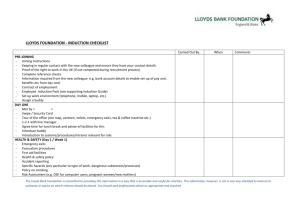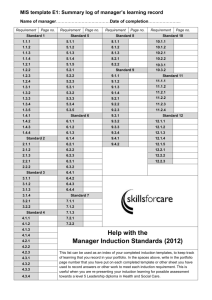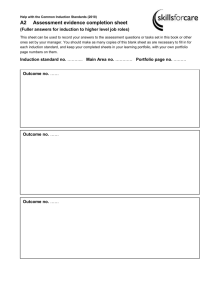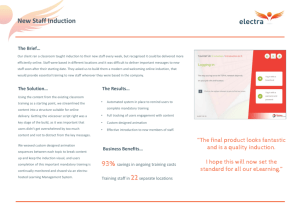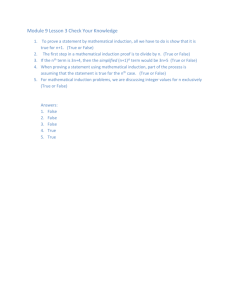Lloyds Banking Group template with instructions
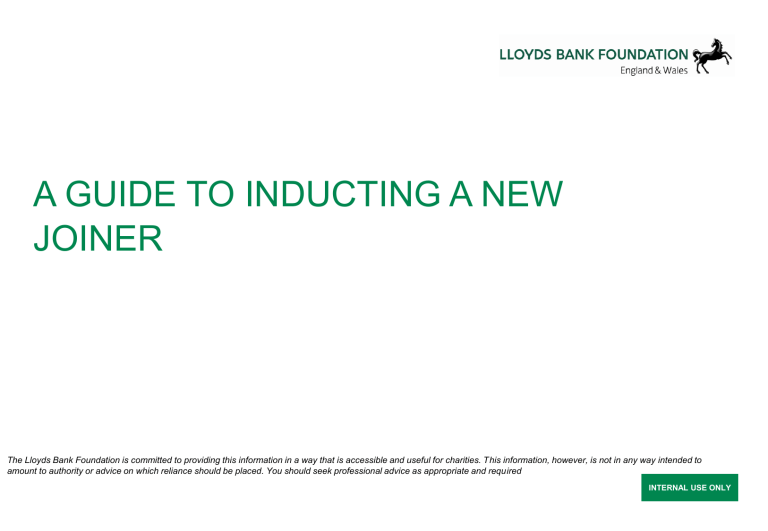
A GUIDE TO INDUCTING A NEW
JOINER
The Lloyds Bank Foundation is committed to providing this information in a way that is accessible and useful for charities. This information, however, is not in any way intended to amount to authority or advice on which reliance should be placed. You should seek professional advice as appropriate and required
INTERNAL USE ONLY
INTRODUCTION
• A good Induction programme makes business sense, whatever the size of the organisation, and whatever the job.
• The length and nature of the induction programme depends on the complexity of the job, and the background of the new employee. One size does not fit all! Individual programmes will need to be tailored appropriately.
• The term induction is generally used to describe the whole process whereby employees adjust, or acclimatise to their jobs and working environment.
The Lloyds Bank Foundation is committed to providing this information in a way that is accessible and useful for charities. This information, however, is not in any way intended to amount to authority or advice on which reliance should be placed. You should seek professional advice as appropriate and required
2
WHO NEEDS AN INDUCTION PROGRAMME?
• All new employees
• Employees that are moving to different areas within an organisation – don’t assume they will know the relevant people, or know everything they need to do in their new role.
The Lloyds Bank Foundation is committed to providing this information in a way that is accessible and useful for charities. This information, however, is not in any way intended to amount to authority or advice on which reliance should be placed. You should seek professional advice as appropriate and required
3
WHY DO EMPLOYEES NEED AN INDUCTION
PROGRAMME? (1)
• The impressions made when someone starts work for a new employer have a lasting impact on how they see their new employer.
• It’s important that induction is not treated as a ‘tick box’ exercise, but is seen as a vital opportunity to introduce new employees to the culture and ways of working. All organisations need to invest time in inducting new employees to help them become productive more quickly, and to help prevent new recruits leaving within their first six months in the job.
• If new employees do not feel well supported or welcome on arrival, never really understand the organisation itself, or their role in it, this may lead to:
• Poor/slow integration into the team
• Low morale for the new employee
• Loss of productivity
• Failure to work to their highest potential
The Lloyds Bank Foundation is committed to providing this information in a way that is accessible and useful for charities. This information, however, is not in any way intended to amount to authority or advice on which reliance should be placed. You should seek professional advice as appropriate and required 4
WHY DO EMPLOYEES NEED AN INDUCTION
PROGRAMME? (2)
In extreme cases, if the new employee leaves either through resignation or dismissal, early leaving can result in:
• Additional cost for recruiting a replacement
• Wasted time for the inductor
• Lowering of morale for the remaining staff – workloads increase
• Having to repeat the unproductive learning curve of the leaver
• Damage to the organisation’s reputation
The Lloyds Bank Foundation is committed to providing this information in a way that is accessible and useful for charities. This information, however, is not in any way intended to amount to authority or advice on which reliance should be placed. You should seek professional advice as appropriate and required 5
THE INDUCTION PROGRAMME
The Induction process begins at the recruitment stage, and can continue for up to 6 months into employment for some roles.
• Pre Joining
Following the completion of the recruitment formalities, ensure there is regular contact with the new employee – do they know who they can contact with any queries or issues they may have ahead of their start date?
Information you need to provide them with
• Joining Instructions
• Start date
• Expected time of arrival on Day 1
•
Dress Code
•
Are there any building/office entry issues they should be aware of?
• Who should they ask for on arrival?
The Lloyds Bank Foundation is committed to providing this information in a way that is accessible and useful for charities. This information, however, is not in any way intended to amount to authority or advice on which reliance should be placed. You should seek professional advice as appropriate and required 6
THE INDUCTION PACK
• An Induction ‘Pack’
This could include:
• Employee Handbook (if applicable)
•
Structure Chart
•
Org Chart
• Jargon Buster
• Literature on the charity
•
Newsletters
• Information you will need from the individual ahead of their Start Date
• Bank Details, NI number – to ensure that the colleague is going to be paid on time
• Emergency contact details – who can you contact on behalf of the colleague
The Lloyds Bank Foundation is committed to providing this information in a way that is accessible and useful for charities. This information, however, is not in any way intended to amount to authority or advice on which reliance should be placed. You should seek professional advice as appropriate and requ ired 7
YOUR PREPARATION FOR DAY 1
• Consider appointing a ‘Buddy’. A Buddy is usually a co-worker, who can act as a guide and adviser to the new recruit. Engage with the appointed colleague to ensure they are briefed on their roles and responsibilities (see Buddy guide in Induction Toolkit)
• Ensure that the line manager (or Buddy if appointed) is available to meet the new colleague on day 1
•
Prepare an Induction Plan (see next section
– What should be Included in an Induction Plan?)
•
Issue a communication to all existing colleagues that a new member of the team will be starting, asking them to join in making the new recruit as welcome as possible
• If you have someone who is responsible for the Reception area, advise them of the new recruit’s name, so it is clear the colleague is expected
•
What IT access/equipment will the colleague require and how much of this can be organised ahead to be available on Day 1?
• Does the colleague need a uniform and any other specialist equipment/clothing? Can this be ordered ahead and be ready for Day 1?
The Lloyds Bank Foundation is committed to providing this information in a way that is accessible and useful for charities. This information, however, is not in any way intended to amount to authority or advice on which reliance should be placed. You should seek professional advice as appropriate and requ ired 8
WHAT SHOULD BE INCLUDED IN AN INDUCTION
PLAN?
• A good induction programme should provide the new employee with the following elements:
• Details of the organisation’s history, its culture and values, and its products and/or services
•
A clear outline of the job/role requirements
•
Explanation of terms and conditions, including key policies
• Practical Information such as office opening hours, how to contact IT, when the fire alarm practice takes place, how to book holiday, arrival procedures, process for claiming expenses.
• Orientation
• Physical - describing where the facilities are
• Organisational – showing how the employee fits into the team and how their role fits with organisation’s strategy and goals
The Induction toolkit provides a practical checklist for you to use
The Lloyds Bank Foundation is committed to providing this information in a way that is accessible and useful for charities. This information, however, is not in any way intended to amount to authority or advice on which reliance should be placed. You should seek professional advice as appropriate and requ ired 9
OTHER THINGS TO CONSIDER
• Also consider the individual’s circumstances. For example, a new starter with considerable recent work experience may have a different induction need from the person with little or no experience.
Other examples of individual circumstances to consider:
• School and College leavers
• People returning to work after a break in employment, or changing their work situations
• Employees with disabilities
• Management /professional trainees
• Night workers/Shift Workers – consider if they will need some time on days or modified shifts to successfully complete their induction
• Information you have learnt from the experience/feedback of previous new recruits
The Lloyds Bank Foundation is committed to providing this information in a way that is accessible and useful for charities. This information, however, is not in any way intended to amount to authority or advice on which reliance should be placed. You should seek professional advice as appropriate and requ ired
10
HOW TO STRUCTURE AN INDUCTION PLAN (1)
• Induction does not need to be a formal process, but it does need to be properly managed
• In most organisations it will be carried out informally by the new recruit’s line manager/supervisor.
• The Induction Checklist included in the Toolkit provides guidance/recommendations of what to cover in the programme.
• If a number of new employees are recruited at the same time, it may be feasible to run group induction sessions – covering common topics.
• When planning the induction programme, remember that people can take in only so much information at any given time, and should not be ‘overloaded’. Make a Plan for
• Day 1
• Week 1
• Month 1 (and following months) .
A blank Plan template is available in the Induction Toolkit – and can be adapted to the needs of your organisation.
The Lloyds Bank Foundation is committed to providing this information in a way that is accessible and useful for charities. This information, however, is not in any way intended to amount to authority or advice on which reliance should be placed. You should seek professional advice as appropri ate and required
11
HOW TO STRUCTURE AN INDUCTION PLAN (2)
• Prioritise the key information required for Day 1. If for example if there are special health and safety requirements, it is important that the new starter understands these immediately - otherwise there is the risk of the colleague being exposed to unnecessary danger/endangering their co-workers.
• Try to let new starters complete some practical work, as this will assist their learning and enable them to relate what they are being taught to what they will be doing.
• Making a plan of activity for Month one (and the following months where appropriate) avoids problems that can arise in trying to arrange time in the future, when the employee has become established in their job.
• Ensure that any mandatory competence training/certification requirements are built into the plan.
The Lloyds Bank Foundation is committed to providing this information in a way that is accessible and useful for charities. This information, however, is not in any way intended to amount to authority or advice on which reliance should be placed. You should seek professional advice as appropri ate and required
12
HOW TO STRUCTURE AN INDUCTION PLAN (3)
• Build in regular one to one meetings between the new recruit and their line manager/supervisor. Use these meetings to celebrate milestones, and recognise key successes.
• Review the progress of the induction plan and evaluate it – is it meeting the needs of the new recruit/organisation? Be prepared to revise/adjust it if appropriate – encourage the inductee to identify any additions to the plan to support any gaps they feel remain in their knowledge/learning.
• These meetings also give the colleague the opportunity to talk about successes, and raise any concerns or issues.
• Recommended Schedule of One to One Meetings
• End of Day one
• End of Week 1
•
End of Month One
• End of Month Two
• End of Month Three
The Lloyds Bank Foundation is committed to providing this information in a way that is accessible and useful for charities. This information, however, is not in any way intended to amount to authority or advice on which reliance should be placed. You should seek professional advice as appropri ate and required
13
DOCUMENTING THE INDUCTION PLAN
• At each meeting record the completion date of each activity.
• Sign and ask the Inductee to countersign - retain a copy and provide one to the inductee.
• Records of this nature can be a vital source of reference later in employment
– for example to check an employee has been briefed on policies, or to produce evidence of training in the event of a health and safety inspection.
The Lloyds Bank Foundation is committed to providing this information in a way that is accessible and useful for charities. This information, however, is not in any way intended to amount to authority or advice on which reliance should be placed. You should seek professional advice as appropriate and requ ired
14
WHAT TO AVOID
• Providing too much too soon – don’t overwhelm the inductee with a mass of information on the first day. Keep it simple!
• Pitching presentations/information at an inappropriate level – they should be suitable for everyone in the audience
• Creating a programme which generates unreasonable expectation – ensure it is achievable
The Lloyds Bank Foundation is committed to providing this information in a way that is accessible and useful for charities. This information, however, is not in any way intended to amount to authority or advice on which reliance should be placed. You should seek professional advice as appropriate and requ ired
15
HOW DO I KNOW THE PLAN HAS BEEN
SUCCESSFUL?
• The colleague quickly becomes confident and productive in their role and their environment
• Retention – the colleague remains in role and continues to develop their effectiveness, and contribution.
• Consider creating a short questionnaire for the colleague to answer, to see if they have any gaps in their knowledge
Examples: ‘ Who signs off training’ , What is the mileage rate for travel expenses?, ‘Is XXX a) a charity b) a limited company c) a charitable company d) a community interest company
?’
Comments from a successfully inducted employee:
• I really understand my role, how to successfully undertake my responsibilities and what it means to be part of this team.”
“I had a lot of new information to digest and tests to complete. But with the full support of my manager and team I managed I understand and enjoying my new role.”
• “I’ve passed my induction and I can start to take on the challenges of my new role.”
The Lloyds Bank Foundation is committed to providing this information in a way that is accessible and useful for charities. This information, however, is not in any way intended to amount to authority or advice on which reliance should be placed. You should seek professional advice as appropriate and requ ired
16
The Lloyds Bank Foundation is committed to providing this information in a way that is accessible and useful for charities. This information, however, is not in any way intended to amount to authority or advice on which reliance should be placed. You should seek professional advice as appropriate and required
17
